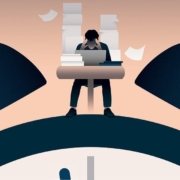Communicating with Kindness
Believe that in every interpersonal communication, leaders should be on the side of kindness. This statement is seemingly simple but it takes courage to live — especially now.
We live in a world in which a host of issues are eating away at our connections with each other. Take lack of focus: When was the last time you had a conversation without one of the people involved checking their phone or multitasking? Or speed: We run from one thing to the next without reflecting on the human implications of what we just did.
But the challenge becomes harder when you consider that people may not want to be kind. Of those who felt strongly about a particular social or political issue, only 30% of people said they would help someone who held a different point of view on the latest Edelman Trust Barometer survey. As a result of political polarisation, everything is becoming a political statement (think about masking coming out of the pandemic). Perhaps as a result of these factors, common incivility is rampant in the workplace.
Great leadership is all about connecting with people by making them feel seen and heard. That means standing against all of these trends and impulses and instead practicing what we can call “gracious communication.”
This involves small gestures and an overall demeanour that allow for connection. For a senior leader — as well as any aspiring leader — this kind of communication is important in day-to-day interactions as well as in big, difficult conversations. You’ll find yourself enjoying stronger relationships and a respected leadership presence, as well as more creativity, resilience, and, ultimately, stronger leadership.
Break down defensiveness with KINDNESS
When you go into a tough environment always start by saying, “Thank you so much for inviting me here today.” Wear a smile when you say this, and I mean it. It shows that you’re there to listen and contribute, not to stonewall anyone. And that’s disarming: It lightens the mood and opens the ears. At the same time, it takes courage and shows your maturity. That allows for more creative, productive problem-solving.
To be clear, we’re not saying that there is no place for showing anger to someone. If they hurt you or your family, for example, anger is an appropriate response. But it’s not the most effective tool for opening minds and moving hearts. Anger shuts the other person down; kindness opens them up.
And, as a leader, others are always watching your communications, and if you are known to be someone who blows, you will be isolated from important negative news. An angry or volatile organisational culture makes it less likely that people will speak up about important risks or problems. That makes your organisation less able to respond quickly to crises.
Give credit where credit is due
People like to be seen and appreciated. Recognising those who deserve it engenders enthusiasm, hard work, trust, and loyalty.
Practicing gratitude and kindness also spurs your creativity: Reflecting on your interaction with someone after the fact often sparks an idea for another opportunity with them, or another way to continue the conversation. It helps you to slow down long enough for those ideas to emerge.
Giving recognition is as powerful for your peers as it is for those you lead. Every time you see someone in a group getting recognition, you must circulate it to the rest of the group. Do this because you admire the people you work with, and honestly believe what you are saying. Believe that it makes you, the credit-giver, look good too: It communicates that you have the maturity and self-confidence to appreciate someone else.
This is a surprising move because claiming credit is the big thing in the corporate world these days. Think about humblebragging: the trend in which someone bemoans how many horrible nights they stayed up late to finish an important project (the point for the audience being how important the project was and how big their role on it). Or posting on social media about how blessed or humbled they are to have achieved a huge promotion. It’s endless and nauseating, because the need to claim credit for everything is destructive and counterproductive in the end.
The urge to claim recognition can be particularly strong if someone has just taken credit for your idea or your work. But before you step in to correct the record, think twice. People are observant; they can often see who is doing the work. Staying silent in that moment, rather than rushing to say “No, I did it!” shows a lot about how confident you feel about yourself and can keep the door open for a connection with the other person.
Of course, there are situations where you should raise your hand and take a bow, such as when you are leading a team that achieved a stretch goal (in which case, say “we”) or when your company reputation is at stake. In the end, giving credit to others can be more powerful for you than taking it.
Give the other party space and clarity
No matter what conversation you want to have with someone, don’t catch them off their guard or off their game. Whether it’s an innocuous quick question or a serious piece of bad news, always ask if it’s a good time and try to give them a sense of what you want to discuss.
This gives your counterpart an opportunity to prepare themselves for any surprises or tough news that you need to share, and makes it clear that you are interested in listening to their response. It can also calm them down — they go from not knowing what to expect to understanding the lay of the land. It gives them a roadmap for your ramble.
This can be as simple as reaching out to a colleague and saying “Is now a good time to discuss our fall campaign?” (rather than just FaceTiming them at odd hours, which I used to do). It could be giving some emotional context for news that could be perceived in different ways.
For big issues this can require a little more preparation: I had something important to talk to my boss about the other week. I told him, “I’d really appreciate it if we could find a few minutes during the offsite to talk about this issue I’m having related to my team,” and sent him a few slides so he would know what it was about and knew to find me when he had 15 minutes, not two.
You won’t always have time to prepare, but there are still ways to give the other person space. If the need to push back on something or deliver bad news comes up in the moment in a conversation, you can say “lLet’s stop right there” and be candid. But if it is a group situation, if possible, wait until the meeting is over and then call them back. Let’s say they said something offensive. Give them a call and say, “You may not know how that landed,” and discuss it from there. Shaming people publicly is not a good idea, but trying to educate others in private is a great idea.
Whatever tactics you choose, the idea is not to burden the other person in your conversation, and instead to be outward focused — on the other person, not yourself. However hard that is, especially in today’s polarized and fast-paced world, it pays big dividends toward your relationships, your leadership, and your own well-being.
CURIOUS ABOUT THE IMPACT OF OUR UNBIASED HR SOLUTIONS?
Take the first step towards transforming your remote work culture by requesting a free demo assessment from Great People Inside.
Our team of experts will guide you through the assessment process, showcasing the effectiveness and value of our tailored solutions for your organization.
During the demo, you will have the opportunity to explore the comprehensive features and functionalities of our psychometric assessments, experiencing firsthand how they can empower your HR strategies and drive positive outcomes. From personality assessments to cognitive abilities and team dynamics evaluations, our assessments provide valuable insights to enhance talent management and foster inclusive remote work environments.
Don’t miss out on this opportunity to test the power of unbiased HR solutions. Request your free demo assessment from Great People Inside today and embark on a journey of fair and effective talent management in the remote work era.
Together, we can unlock the true potential of your remote teams and achieve remarkable success.Request a Free Demo Assessment.

Laura Dragne is a dedicated PR enthusiast deeply committed to championing CSR initiatives and advocating for impactful social involvement. Her PR journey has instilled in her a profound belief that every interaction holds the potential to broaden one’s understanding of both oneself and the world. A proud graduate of Social Communication and Public Relations from the University of Bucharest, Romania, Laura seamlessly merges her academic knowledge with a heartfelt dedication to effecting positive change through purposeful communication strategies and community engagement.
Sources:
https://www.spreadingkindnesscampaign.org/personal-kindness/communication
https://www.linkedin.com/pulse/your-tone-matters-strategies-communicating-kindness-diane-a-ross
https://www.corporatewellnessmagazine.com/article/the-power-of-small-acts-of-kindness-how-to-encourage-a-supportive-work-environment











